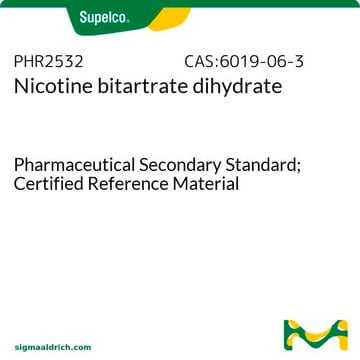1463304
USP
Nicotine bitartrate dihydrate
United States Pharmacopeia (USP) Reference Standard
Synonym(s):
(−)-Nicotine hydrogen tartrate salt dihydrate
About This Item
Recommended Products
grade
pharmaceutical primary standard
API family
nicotine
manufacturer/tradename
USP
application(s)
pharmaceutical (small molecule)
format
neat
storage temp.
2-8°C
InChI
1S/C17H15ClN2O3/c1-9(2)16(22)19-11-4-5-14(21)12(8-11)17-20-13-7-10(18)3-6-15(13)23-17/h3-9,20H,1-2H3,(H,19,22)/b17-12-
InChI key
YGMGVHYZWYRTJJ-ATVHPVEESA-N
Looking for similar products? Visit Product Comparison Guide
General description
Application
Also used to prepare standard, system suitability, sensitivity, and standard stock solution for assay, identification, performance test, and impurity analysis according to the given below monographs of United States Pharmacopeia (USP):
- Nicotine
- Nicotine Polacrilex
- Nicotine Transdermal System
Analysis Note
Other Notes
related product
Signal Word
Danger
Hazard Statements
Precautionary Statements
Hazard Classifications
Acute Tox. 1 Dermal - Acute Tox. 3 Inhalation - Acute Tox. 3 Oral - STOT RE 1
Storage Class Code
6.1A - Combustible acute toxic Cat. 1 and 2 / very toxic hazardous materials
WGK
WGK 3
Flash Point(F)
Not applicable
Flash Point(C)
Not applicable
Certificates of Analysis (COA)
Search for Certificates of Analysis (COA) by entering the products Lot/Batch Number. Lot and Batch Numbers can be found on a product’s label following the words ‘Lot’ or ‘Batch’.
Already Own This Product?
Find documentation for the products that you have recently purchased in the Document Library.
Customers Also Viewed
Our team of scientists has experience in all areas of research including Life Science, Material Science, Chemical Synthesis, Chromatography, Analytical and many others.
Contact Technical Service







